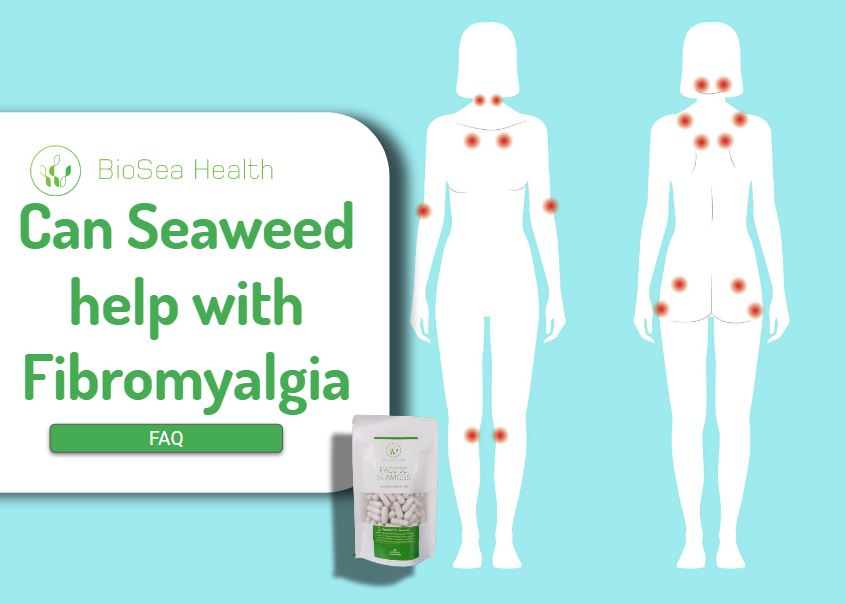Q. A customer who was looking for period pain relief asked us: I have fibromyalgia – does seaweed help reduce fibromyalgia?
A. We don’t have any participants in a pilot trial for dysmenorrhea who told us specificially they have fibromyalgia. We do have anecdotal feedback from other customers though. Fibromyalgia (for fibro) is complicated as it “rewires” the brain from pain. With Pacific Seamoss seaweed we know most customers say they feel better in a week to 10 days. Over the past decade seaweed is implicated in improvement.
What is Fibromyalgia
Fibromyalgia is often accompanied by fatigue and altered sleep, memory and mood. Checkout WebMD or the Mayo Clinic. People may have widespread muscle pain and tenderness is the most common symptoms.
Medication, yoga, acupuncture, exercise, Cognitive Behavior Therapy (CBT), and stress reduction may help manage symptoms.
- Treatment can help, but this condition can’t be cured
- Requires a medical diagnosis
- Lab tests or imaging rarely required
- Chronic: can last for years or be lifelong
Fibromyalgia may be triggered by a stressful event, including physical stress or emotional (psychological) stress. Possible triggers for the condition include an injury or a viral infection.
Will seaweed cause any fibromyalgia interaction?
We have not had any feedback from customers that it has done any harm, and they generally report positive improvements. Some have reported reduced restless leg syndrome. Seaweed won’t do you any harm at all – unless you are allergic to seaweed. About 5% of customers say they have some GI (gastro intenstinal) bloating – but you would do if you starting eating a can of baked beans a day. Most of these already have severe GI issues – and some eat no fibre etc. So the addition of fibre can be a shock when you have none. The majority of others find taking a smaller amount of seaweed (maybe 2 to 3 capsules per day) and eating it with other food removes any issues. Given that one of the strategies is improved diet, seaweed will support that.
Prof Lindsay Brown has been assessing seaweed for intervention in obesity related diseases for the past decade. [3] Kumar worked with Prof Brown and recently wrote a comprehensive review [4].
However, for the past 20 years various researchers [5] have been looking at brown seaweeds and in particular the fucoxanthin compounds for activity in diseases. A search on Google Scholar will show a number of recommendations and some research on seaweed and fibromyalgia. The difficulty is that none have progressed past the lab. The benefits may be as simple as reduction in iodine deficiency as iodine is considered a contributor to fibromyalgia. Pacific Seamoss contributes about 15% RDI (%DV). Other brown seaweeds have higher levels iodine.
Alternative Remedies
There are a range of other strategies, and one that seems counter intuitive is weighted blankets. Why – weighted blankets are commonly used to help with a variety of conditions from ADHD and autism to Restless Leg Syndrome. Even more importantly, these blankets may be able to help manage pain related to fibromyalgia. This blog is a good starter for further reading blog post
References
[1] Fibromyalgia Mayo Clinic https://www.mayoclinic.org/diseases-conditions/fibromyalgia/symptoms-causes/syc-20354780
[2] Fibromyalgia – WebMD https://www.webmd.com/fibromyalgia/default.htm
[3] Kumar, S.A., Brown, L. Seaweeds as potential therapeutic interventions for the metabolic syndrome. Rev Endocr Metab Disord 14, 299–308 (2013). https://doi.org/10.1007/s11154-013-9254-8
[4] Kumar M & Sharma S (2020) Toxicological effects of marine seaweeds: a cautious insight for human consumption, Critical Reviews in Food Science and Nutrition, DOI: 10.1080/10408398.2020.1738334
[5] D’Orazio, N.; Gemello, E.; Gammone, M.A.; De Girolamo, M.; Ficoneri, C.; Riccioni, G. Fucoxantin: A Treasure from the Sea. Mar. Drugs 2012, 10, 604-616.

